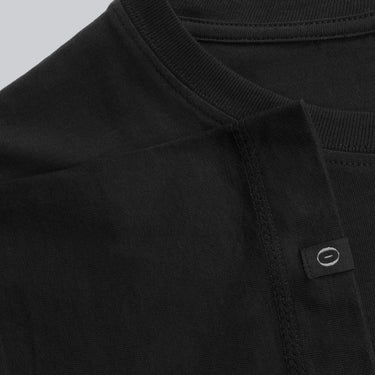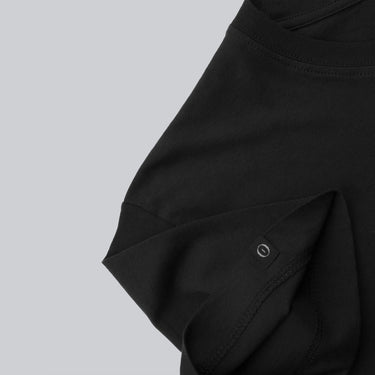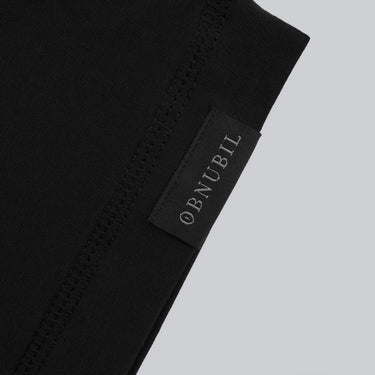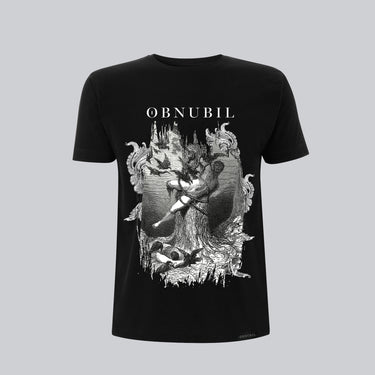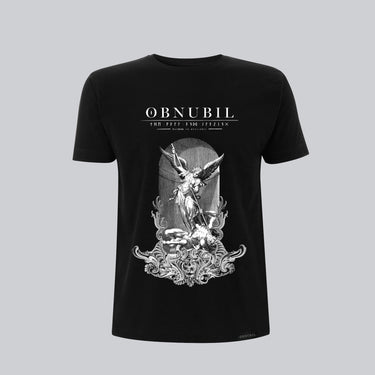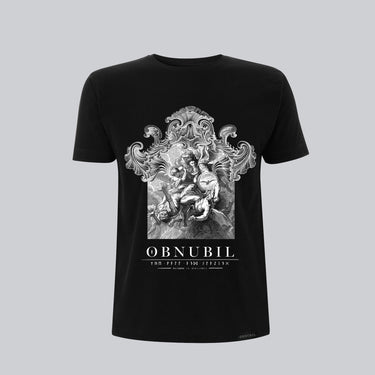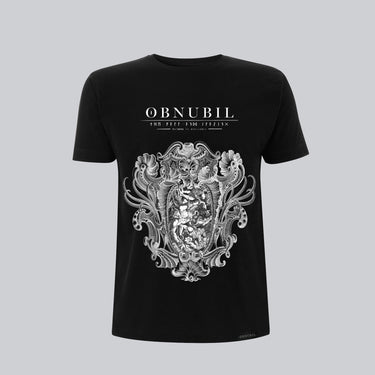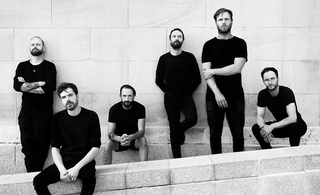
The Ocean (also known as The Ocean Collective) is a German Progressive Post Metal band started in 2000 by German guitarist and Pelagic Records founder Robin Staps. The Ocean has had many different line-ups since its inception, but since the end of 2018, it seems that the line-up has been firmly consolidated and it seems to mark a before and after. Right now band members are Robin Staps (guitar, programming and backing vocals from 2000 to present), Loïc Rossetti (lead vocals from 2009 to present), Paul Seidel (drums and backing vocals from 2013 topresent), Mattias Hägerstrand (bass from 2015 to present), David Ramis Åhfeldt (guitar from 2018 to present) and Peter Voigtmann (synths from 2018 to present).
At present, after two decades of creating gut-wrenching, mountain-moving, guitar-noise the band are back with a new record, Holocene, a new album that will take the band into an artistically promising future. With Holocene, The Ocean wants to draw us into their momentum of truly forward-thinking music and relentless live performances. More than 20 years into their career, this Berlin-based collective still shake us to the core, inviting us to reconsider our lives from different angles. The album unites the might of this massive act's past and present, while creating a deeper understanding of their world as well as ours in the process.
During the day of their last pass through Madrid at the beginning of June 2022, I caught up with the band hours before the show for a photo shooting, a job done to accompany the announcement of the new album Holocene. Among all the works that I have come to do so far under Obnubil Studio, this has been by far the most significant and most proud of! It took a lot to put up with half a year to publish it, but good things always make you wait. And now, I bring you a recent interview with Robin Staps and David Ramis Åhfeldt.

INTERVIEW
OBNUBIL: You have had a tour with more or less 155 dates in 12 months, especially the last half year has been very demanding. What has been your experience of touring for so long?
DAVID: Before starting the tour cycle it was a bit overwhelming to just think about the amount of shows we were about to do, intense touring can mess up with your physical and mental health, so I personally made the conscious decision to try to stay as healthy and focused as possible. But the overall experience has been incredible, we came home with many memorable experiences.
OBNUBIL: You are an example to follow for many bands for your effort and dedication to your work. You have been touring all over Europe, Latin America and North America. What differences do you find in all this diversity of countries?
DAVID: Thank you very much. It’s true, we love touring, traveling and using our music to explore the world is part of the DNA of this band, it has been like this for many years and still it is.
There are some differences between touring Europe or America. Of course touring Europe, it feels like touring more like home, we are based in Germany but most of us come from different parts of Europe such as Sweden, Spain or Switzerland, so it’s always nice to be able to go to any of this places and meet friends or family that you might don’t get the chance to see often.
One of the biggest differences about touring Europe VS UK or USA is the hospitality, for example in the States they don’t serve catering for the bands instead they give you a buyout which can be from 5$ to 20$ if you’re lucky, during both tours we did in the states, we exchanged with the fans food or supplies for a Meet & Greet experience and that was a great way to get close to our fans and also to get to know them in a more personal way. Then you have Latin America where people are extremely passionate about music. It was such a vibrant feeling to hear the fans signing along the riffs, that was one the most memorable experiences for me.
OBNUBIL: In the US, did you encounter problems at the border? What happened and did it affect you in any way on the tour?
DAVID: We just played a show in Toronto and we had to drive back into the United States. We were informed about a massive snow storm, so we decided to take the longer but safer route towards our next show in Pittsburg, when we arrived to the border control we had the bad luck to stumble upon someone who wanted to make our lives miserable for no reason, our driver went through a 4 hours interrogatory, they wanted to find the tiniest excuse to not let us enter the country but at the end everything was fine but unfortunately we missed the Pittsburg show, probably one the lowest points on the tour cycle I would say.
OBNUBIL: In addition to the problems we talked about before, Loïc suffered a severe injury that forced him to perform with a wheelchair or crutches on several concert dates. How did you approach this problem and what barriers did you encounter during the tour?
DAVID: Another lowest point of the tour was indeed Loïc’s injury. There were some moments of confusion as it’s really hard to figure out how to deal with a situation like this, first thing we did the day after the accident happened was to go to the Hospital, there they informed us that Loïc needed surgery but as we all know how the healthcare system works in the States we knew that was not an option. So Loïc’s insurance decided to fly over a nurse from Zürich to San Francisco, pick him up and assist him during his fly back to Switzerland, that took some days, until that happened Loïc blew our minds by playing 2 shows with both legs completely broken, watching him signing the way he sang while knowing how much pain he was going through proofs that this is not a job for everyone.
OBNUBIL: We cannot forget the very serious mishap that Robin had in Puerto Rico. What happened that day? We imagine that it also marks a before and after.
DAVID: We used some of the time off that we had in Puerto Rico to film the video of Parabiosis and Subatlantic. That day we went to a beach called Playa Escondida, before getting there some locals warned us about the currents and we even talked about it in the car but unfortunately we did not pay as much attention to it. We spent the day at the beach while Loïc and Robin were filming, when they finished Robin decided to go to the water and 5 minutes after we realized that he was waving his arms asking for help as he couldn't get out of the water, we called the emergency immediately, but it took more than 3 hours until an Helicopter and boat arrived, it got dark while waiting for the rescue team that made it even more complicated but somehow we managed to stay calm and very well organized despite the scope of the situation, luckily everything ended the best possible way and we could move forward with the tour and the rest of the plans we had.
OBNUBIL: The public wonders how it is possible to combine the other musical facets, as well as work issues and personal lives of many of you, with the band's very busy schedule. For example, Paul is a music teacher and has other musical projects like Nightmarer or his more personal project Fern. Or Peter, who has a music production studio. Has it been difficult to do it?
DAVID: The band takes a lot time and commitment but I guess there is time for everything, I personally work as Web Developer and I do two full time jobs when touring, it’s very tiring but satisfying at the same time, I like the fact that I can keep myself busy when there is some dead time on tour, when you leave home for such a long time it feels you put your regular life on standby and by being able to keep doing your job it kind of help to maintain the routine that you would normally have at home.



OBNUBIL: From Obnubil we promote and support veganism, we know that in the catering of your tour there was also a lot of vegan food. With so much time on wheels, we understand that taking care of your diet and taking care of yourself in general is a very important factor. How do you spend your few free moments during tours? Some tourism? Sport?
DAVID: Definitely! Taking care of our diet and having proper sleep are basic needs I always ask to have on tour. There have been times when the day has been so busy that you barely had time to eat even one proper meal. This is when you have to set some boundaries and put your well-being as a priority. Depending on where we tour, it gets easier. For example, as mentioned earlier, here in Europe, hospitality is different compared to other parts of the world. The promoter normally makes sure you are being fed on the day of the show. Of course, that depends on the previous agreement you have with the promoter. Normally, when there is catering, it's for the band and crew. It’s always nice not to have to think about when and what you are going to eat while you are on tour. Being on tour is already quite intense and very busy. Regarding how we spend our free time, it really depends on how the routing of the tour has been planned. We normally don’t have many days off. We try most of the time to squeeze in as many shows as possible because days off are very expensive. As you still have to cover the costs (bus, accommodation, food, etc.), and there is no income. When there is a day off, it's normally because the distance between one show and the next show is huge. So basically, it’s a travel day, probably the most boring day of the tour because you have to be stuck inside the bus the whole day. But I also have to say that when we tour places like South America, Asia, or Australia, we try to keep some days off where we plan to have proper time off where we use it as we want. Some of us like to just chill and recharge, and some of us like to go and explore new places. For example, on our last South American tour, on Christmas Day, me, Loïc, Robin, and our FOH Victor rented a car and drove all the way to Torres del Paine. This was such a nice experience to have and a beautiful memory that will last forever, definitely one of the highlights of the year!
OBNUBIL: If we add to the difficulties we were talking about earlier that you are a band made up of members from a multitude of countries, how is it possible that you are such a prolific band in terms of compositions and recordings? Let's remember that Mattias lives in Stockholm, David spends a lot of time in Mallorca, others are in Berlin, Hamburg, etc…
DAVID: We are not the type of band that practises on a weekly basis, that would never work for us, as you said, we live in different parts of Europe, so whenever we have a project ahead of us whether it is recording our touring we all meet for a couple of weeks and we work intensively as we need to use the little time we have together the most efficient way possible.
OBNUBIL: Also, it shows that you have given a 180 degree turn to the aesthetic part of the band. On a creative level, the cover designs and arts in general are totally revolutionary. What is this aesthetic change due to?
ROBIN: There is a line in the lyrics of the closing track Subatlantic that goes '… prepare for departure’. This album is about departure in many ways; sound wise it’s opening new doors for us, it's more electronic, it’s the end result of a different approach to writing between Peter and me, and conceptually it’s a final departure from the palaeontology-inspired album series that we started with Precambrian in 2007 and continued with the Phanerozoic albums in 2018 and 2020. So naturally, I wanted the album art to also reflect this.
The artwork is a collaboration between our old friend and associate Martin Kvamme and Stefan Alt whom I knew through the Lustmord compilation which I released on Pelagic, for which The Ocean also contributed a track. The initial drafts that Stefan came up with were great, but too predictable, too much what you would expect from an Ocean album, and so we started over from scratch. We wanted something with a more modern, more contemporary feel while still making reference to the circular theme that we’ve used on the previous album, which is synonymous for the main lyrical idea behind the Phanerozoic albums, the idea of Eternal Return. The artwork creation process took well over a year and a ridiculous amount of work hours went into this, but it was worth it.


OBNUBIL: It is obvious that you give a huge importance to the creative and visual part of your work. You have always taken great care of everything related to merchandising, the type of paper and printing of the record booklets, the special editions of the vinyls... Most of the bands do not have so much care in the graphic detail and are only focused on the sound part. How do you think this visual point affects a band? Do you think it's a differentiating element compared to bands that don't?
ROBIN: Absolutely. I’ve always embraced a holistic approach to art, in the case of this band obviously the music is the focal point but there is also so much more to it. You can express so much with visual arts, why would you not make proper use of that? For me that's an integral part of being serious as an artist. An album with great music but mediocre art is a bit like waking up in a hotel room and not knowing whether you’re in Helsinki or in Madrid because the furniture is the same everywhere, it’s IKEA. If you leave artwork and packaging up to chance or if you don’t put the same effort into it as into your music, then you’re losing a very important facet of standing out of the mass, the immense flood of releases.
I've always admired the bands that took great care of their graphic and visual expression and tried to push boundaries there. And on a personal note, I’ve always enjoyed flirting with different materials, going to the limits of what is physically and financially possible and the challenge of trying to come up with packaging that is ground-breaking and unique. If you want music fans to buy a physical album these days, you’ve got to give them a very good reason. And outstanding packaging is the best reason you could give them.
OBNUBIL: Can you tell us about your new album Holocene which will be out next May 19? You have accustomed us to very conceptual works. Will this new album follow that trail?
ROBIN: Holocene, the album title, for us is synonymous for both the modern and the postmodern age, and all the lyrics on this album deal with topics that flared up during the past 2 years: the weirdness of this time, the conspiracy theories that flared up during the pandemic and the social segregation even among close circles of friends that came with it. Each track is tackling a different subject on this album, so in a way, it is the least conceptual Ocean album to date… but still all topics are related and can be summarized under the umbrella of general alienation, segregation and loss of critical thinking due to social media as main source for news & opinion-forming, paired with the general short attention span and focus on spectacular images rather than text, discourse and logic.
The opening track Preboreal is most representative of the album’s lyrical direction as a whole: it’s based on Guy Debord’s ’Society of the Spectacle‘, a book about the sheer power of the image. A book that was written long before the internet which seems almost prophetic now in the light of our current image-dominated Instagram & YouTube society, where mere representation is often replacing actual content.
OBNUBIL: After the first single Preboreal, the album’s second single Parabiosis and forth single Subatlantic have been accompanied by some fantastic video clips. It is a mystery to us how you have been able to take the time between so many concerts to devise and record the video clip, in addition to having done a photo shoot and so on. Let's remind the public that you have had a very demanding tour in terms of dates and calendar.
DAVID: That’s very true! It has been a pretty intense time for us. Parabiosis and Subatlantic where filmed during our last US and Latin America tour, we used the few off days we had to shoot, we brought with us Drew Storks, a phenomenal videographer that also plays bass in the band Shy Low to make that happen, both videos were filmed in Canada, US and Puerto Rico, we wanted very different scenery for both videos, so we took the opportunity of being able to constantly being in different places.
OBNUBIL: Third single under the title Sea Of Reeds, was published accompanying a music video directed by Adrian Shapiro. Adrian is a bassist and vocalist in the Australian band Lo!, with whom we have also had an interview recently (specifically with his guitar and vocalist Carl Whitbread). We assume that the joint work has arisen since they are also in Pelagic Records, how has it been working on this video? We have read something about that this song was inspired by the bible, the old testament tale of Exodus. Can you please tell us more about this?
ROBIN: I’ve released all Lo! albums and The Ocean have toured with Lo! In Australia, so I’ve known Adrian for years, and I’ve always been a big fan of his video work. Finally the stars aligned for us to work together. His approach is a very free but very beautiful interpretation of the lyrics of the song, which are indeed inspired by the tale of Exodus. God divided the waters of the Red Sea, the Sea of Reeds, so that the Israelites could flee from the Egyptians, and he clogged the wheels of their persecutors’ chariots and then drowned them in the sea.
The Old Testament is full of tales of miraculous healing, water turned into blood, locusts falling from the sky, the parting of the sea… but can there be space for the concept of love in a doctrine that relies on supernatural powers to prove its god’s almightiness? A god who parts the waters of the sea to decide who’s going to live and who’s going to die is a fearful entity, and the lesson to be learnt from Exodus is that you should worship a god with such immense powers because otherwise he’s gonna fuck with you real bad. But a god who needs miracles to convince his sheep to admire him and to follow his leadership can only be a vain god, and in vanity lies weakness and vulnerability, even for a god… because the vain self depends on the admiration of others. And this is the important note for the level of human relationships - dependency.
We often look up to our loved ones as deities and we conceive of love as a supernatural force itself, something that hits us out of the blue and transforms us and the world around us. But when you remove the supernatural color grading, love is essentially a choice. It’s a voluntary decision to let yourself in for something (and sometimes even to push yourself into something), or not. It’s not something that happens to you if you’re lucky, or doesn’t if you’re not. It essentially relies on meeting someone at eye level and while it can involve worship to some degree, too much of it is going to create a hierarchy that is going to ruin it.
OBNUBIL: Do you already have scheduled dates for concerts after the presentation of the new album Holocene?
DAVID: Yes! This summer we will be doing some festivals like Brutal Assault or Arctangent and hopefully after the summer festival season we will start the Holocene touring cycle, at the moment we cannot announce anything than what it’s already announced, but we recommend to all of you to check our social media or our website theoceancollective.com, to get all the latest news about the band and upcoming shows/tours.
OBNUBIL: We don't want to say goodbye without first thanking you for taking the time to answer our questions and asking you to dedicate a few words about what recording your new album Holocene has meant to you and what you think it will mean to your fans.
DAVID: Holocene is a very different album compared to other Ocean records, it was written during weird times and you can feel that while listening. We are super excited to show it to the world and to go on tour again and play all this song live to all of you, see you on the road!
Interview done April 2023. Photos taken by Jaqueline Vanek from Obnubil Studio.
Tour posters from the last 12 months (excluding festivals):









